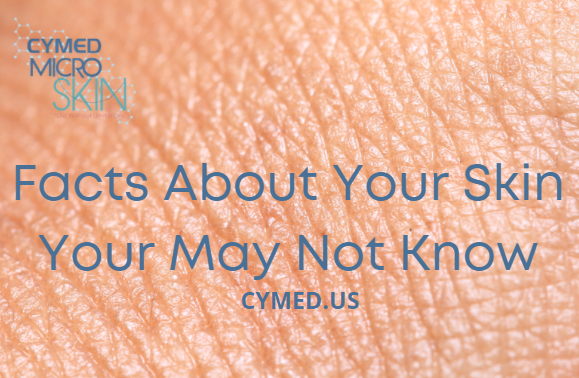Human skin is a marvelous, complex, and sophisticated organ that we may never fully appreciate. Since we offer several medical products that involve skin contact, we thought it might be fun to check out some of its more intriguing aspects. We hope you enjoy these 9 fascinating skin facts.
9 Facts About Your Skin You May Not Know
Yes, it’s an organ and the largest one at that.
Skin constitutes 15% of your body weight. The average adult has enough skin for roughly 11 miles of blood vessels. Remember that the next time you drive 10 or 15 miles down the highway.
Your skin hosts a wide variety of microorganisms.
Skin is home to an illustrious microbiome of more than 1,000 bacteria specimens. Don’t worry though. Although it’s important to maintain clean skin, much of the bacteria are good and serve an important immune-system function.

There are three important skin layers.
Going from the top layer inward, your skin is composed of epidermis, dermis, and hypodermis. Each of them plays an important role in protecting you from foreign elements, fostering connective tissue, and even allowing hair growth.
The skin cycle renews every 28 days.
Similar to snakes, our skin goes through phases of shedding and replenishing. This is a process where the epidermis sheds away all the dead skin cells periodically.
Despite skin renewal, tattoos still remain in place.
What holds your tattoo there when the epidermis sheds every 28 days? The macrophages in the dermis (middle layer) absorb the tattoo ink in such a way that it actually preserves the ink even after the loss of the outer layer.
Humans have four skin types.
Some folks have dry, oily, normal, or a combination of skin types. This hinges upon your body’s propensity for water storage. This is important to know whenever you shop for ileostomy, colostomy, and urostomy products.
Sweat glands prevent heat exhaustion.
Just one square-inch of skin contains about 300 sweat glands. The two major types are the eccrine and apocrine glands. The former helps you sweat and remain cool all over your body, whereas the latter exists in hair follicles to keep those areas cool as well.
Your skin also regulates your body temperature.
In addition to sweating, your skin has a temperature-regulating function known as vasodilation. Here is where the interior blood vessels dilate, increase blood flow, and allow heat to dissipate whenever your body temperature exceeds a certain threshold.
Sunlight can become addictive.
While it’s difficult to obtain too much Vitamin D through our body’s natural photosynthesis (which isn’t just a plant function), it’s possible to overdo it with sunlight. This isn’t the worst problem, but we should always remember to avoid excessive sun exposure in light of melanoma risks.
Cymed welcomes you to learn more about skin, including our aptly-named MicroSkin products, which are expertly crafted to conform to your skin. Find out more by calling us at 800-582-0707 or by filling out the form below.
